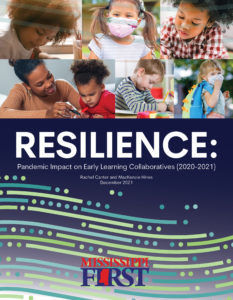- Early Education
Early learning collaboratives (ELCs) in Mississippi were resilient during the 2020-2021 school year. Like all schools and educational programs across the globe, ELCs had to make dramatic accommodations in order to ensure safety. Having access to additional resources during the most trying time in education allowed ELCs to make the shifts they needed within the constrictions of COVID-19. ELCs’ ability to offer high-quality pre-K in Mississippi, especially in this time of crisis, will have a lasting, positive impact on kids throughout their entire educational journey.
Major Takeaways
In this investigation, we learned none of the collaboratives permanently closed their programs, although learning had to change to respond to the exigencies of the pandemic. Despite evolving enrollment, ELCs were able to maintain maximum class sizes of 20 students. ELCs were also able to retain teachers and teaching assistants through the entire 2020-2021 school year. Every ELC used the additional funds provided by the 2020 per-pupil rate increase to extend or maintain high-quality learning for their students in this critical time. Today, ELCs are poised to learn from each other, continuing to make Mississippi’s ELC program the best in the country.
Authors

Rachel Canter
Executive DirectorRachel Canter is the Executive Director of Mississippi First and author of many Mississippi First reports, including Leaving Last in Line, the State of Pre-K series, and Public Perception of Public Charter Schools (2019). Rachel founded Mississippi First in 2008.

MacKenzie Hines
Former Chief of StaffMacKenzie led communications and operations work at Mississippi First. She had been the lead designer for all Mississippi First publications since 2013. In 2020, she authored Learning from the Moment.


